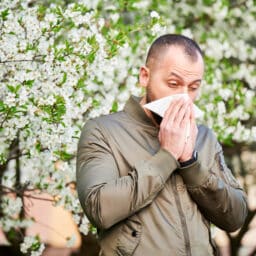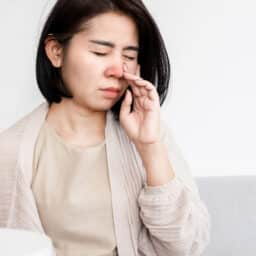Why Does Steam Help Clear Congestion?

Approximately 12% of the U.S. population is experiencing nasal congestion, also called a stuffy nose, at any given time. While a stuffy nose isn’t usually a cause for immediate alarm, it can be an annoying symptom when prolonged. Let’s look at common causes of congestion and why steam can help relieve your symptoms. Common Causes…
Why Has My Allergy Medication Stopped Working?

Approximately 30% of U.S. adults experience at least one type of allergy. With pollen season right around the corner, you probably want to ensure your allergy management plan works effectively. If you have been successively managing your allergies with medication—whether antihistamines, nasal sprays or decongestants, but they haven’t been as effective recently, there are generally…
How To Spring Clean Allergies Out of Your Life

As the sun starts to shine and the flowers begin to bloom, you will probably start making a list of all the things you want to accomplish this spring. Between running through Brittlebank Park and enjoying an afternoon on the water, consider adding a few allergy-friendly cleaning chores to your to-do list. Spring cleaning gives…
Understanding Rhinitis: Allergic vs. Non-Allergic

Rhinitis, a condition characterized by inflammation of the nasal passages, affects approximately 40% of the world’s population. It can be caused by multiple factors, with allergies and non-allergic triggers being the primary culprits. Understanding the key differences between allergic and non-allergic rhinitis is crucial for effective management and treatment. Allergic Rhinitis Allergic rhinitis, commonly known…
What to Do If Allergies Are Triggering Your Asthma

Asthma is a chronic lung condition resulting in inflamed airways that are sensitive to triggers that don’t typically bother other people. These triggers can include exercise, airborne irritants, weather, some medicines and allergies. When experiencing allergic asthma, it’s great to understand what causes it so you can take steps to avoid your triggers and manage…
What Are Adult-Onset Allergies?

Strolling through Chapel Street Fountain Park on a sunny Saturday only to be met with an onslaught of sneezing can be quite the surprise. While it may seem that your sneezing arises out of nowhere, it is possible that it is symptomatic of adult-onset allergies. What Are Allergies? Allergies are an immune system overreaction to…
Make Managing Allergies Your New Year’s Resolution

It’s that time of year again—time to take stock of your life and find the perfect New Year’s resolution to make 2024 your best year yet. More than 50 million people in the United States have an allergic reaction each year. If sneezing, hives and coughing have been your constant companions for years past, taking…
Common Causes of Itchy Eyes, Throat and Ears

Itchy eyes, ears and throat could have a few causes that aren’t usually serious. You may even be able to treat the causes with home remedies. It’s still a good idea to stay educated on potential causes so you can know when it’s necessary to seek help. Illnesses, allergies, infections and environmental factors could all…
Reasons You Always Have a Stuffed-up Nose

A stuffed-up nose sounds like a minor symptom but can be frustrating and annoying. If your nose is constantly stuffed up, it is likely caused by an underlying condition. Four common conditions that cause a stuffy nose are allergies, sinusitis, nasal polyps and the common cold. Allergies Allergies are an immune system overreaction to a…
Can Allergies Affect Your Taste and Smell?

A loss of smell (anosmia) and taste (ageusia) can arise from a number of factors, including age, health problems and adverse reactions to medicine. Allergic rhinitis is a common condition that can result in temporary loss of taste and smell. Allergic rhinitis is one of the most common types of chronic rhinitis, affecting approximately 10%…
